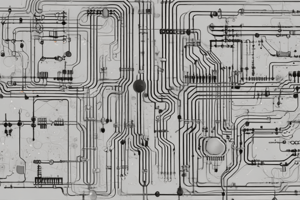Podcast
Questions and Answers
What is the direction of electric current flow?
What is the direction of electric current flow?
- From positive to negative terminals (correct)
- From negative to positive terminals
- From the anode to the cathode
- From the resistor to the capacitor
What is the unit of measurement for electric current?
What is the unit of measurement for electric current?
- Volts (V)
- Ohms (Ω)
- Amperes (A) (correct)
- Watts (W)
What is the physical property that opposes electric current flow?
What is the physical property that opposes electric current flow?
- Voltage
- Inductance
- Current
- Resistance (correct)
What is the formula that relates voltage, current, and resistance?
What is the formula that relates voltage, current, and resistance?
What type of material allows electric current to flow?
What type of material allows electric current to flow?
In a series circuit, what is the characteristic of the current?
In a series circuit, what is the characteristic of the current?
Flashcards are hidden until you start studying
Study Notes
Electrical Basics
Electric Charge
- Electric charge is a fundamental property of matter
- There are two types of electric charge: positive and negative
- Like charges repel each other, while opposite charges attract each other
Electric Current
- Electric current is the flow of electric charge (e.g. electrons)
- Measured in amperes (A)
- Current flow is from positive to negative terminals
Voltage (Electric Potential Difference)
- Voltage is the potential difference between two points in a circuit
- Measured in volts (V)
- Can be thought of as the "pressure" that drives electric current
Resistance
- Resistance is the opposition to electric current flow
- Measured in ohms (Ω)
- Depends on the material, length, and cross-sectional area of a conductor
Ohm's Law
- Relates voltage, current, and resistance: V = I × R
- Can be rearranged to solve for any of the three variables
Conductors and Insulators
- Conductors: materials that allow electric current to flow (e.g. copper, aluminum)
- Insulators: materials that resist electric current flow (e.g. rubber, glass)
Series and Parallel Circuits
- Series circuit: components connected one after the other
- Current is the same throughout the circuit
- Voltage is divided among components
- Parallel circuit: components connected between the same two points
- Voltage is the same across each component
- Current is divided among components
Studying That Suits You
Use AI to generate personalized quizzes and flashcards to suit your learning preferences.




